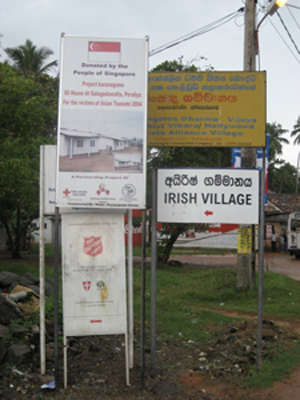Navigation auf uzh.ch
Navigation auf uzh.ch
Responsible for the doctoral project: Dr. Pia Hollenbach (doctoral thesis 2014)
Funded by: Humer-Foundation for Academic Talent
Project duration: June 2008 – May 2011
Doctoral committee: Prof. Dr. Benedikt Korf, Political Geography, Department of Human Geography/URPP Asia and Europe; Prof. Dr. Christoph Uehlinger, Religious Studies, Institute of Religious Studies/URPP Asia and Europe; Dr. Urs Geiser, Human Geography, University of Zurich; Prof. Dr. Jonathan Spencer, Sozial Anthropology, University of Edinburgh
Research Field: Norms and Social Order(s)

The Indian Ocean Tsunami on 26th December 2004 generated an unprecedented scale of financial support and non-financial donations after a natural disaster. Some international humanitarian aid organisations received within two days the amount of donations usually received in a “good” year. From the beginning the pressure was on the agencies not only to be effective but also to be seen to be effective. They had to justify the vast investments stakeholders had made in the relief effort. Quite soon the 13 tsunami-affected countries were considered over-funded and had to deal with an enormous number of aid organisations, private aid initiatives and bilateral relief projects. Tsunami rehabilitation and humanitarian aid became competitive working field. Moral aspects and work ethics of humanitarian and emergency work as well as international standards and codes of conduct were no longer respected and overlooked.
As little research on the ethnography of humanitarian aid has been conducted, this research project aims to support a shift in current academic approaches in humanitarian aid, where discussions on humanitarian aid usually start from the level of principles rather than practice. The research project is based on two and a half years practical work experiences with a German aid organisation in Sri Lanka. Empirical material was collected during this time through participatory observation, documented talks and semi-structured interviews with involved stakeholders (donors, aid organisations, government authority of Sri Lanka, recipients). Based on this material, with an ethnographic view it is argued that the everyday practices and dilemmas faced by aid workers and implementing agencies help to counterbalance inflated expectations, expose uncritical admiration, and put unrealistic critiques into perspective.Being involved in the tsunami rehabilitation as part of the aid machinery, the daily working experiences within the system of donor-receiver expectations and negotiation with other local actors, will make it possible to decode the system and theoretically explain how and why certain project decisions and aims are established and what influences and forms the aid business.